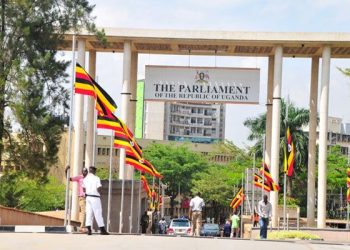The Supreme Court has dismissed an application in which lawyer Hassan Male Mabirizi sought to crossexamine the speaker of parliament, Rebecca Kadaga, over her role in the Constitutional amendment Act, 2018, which uplifted the presidential age limit.
In their unanimous decision, a panel of seven justices, led by Chief Justice Bart Katureebe, ruled that the affidavits in support of the case of the Attorney General and Mabirizi were not filed in accordance with the law. According to the Justices, the affidavits offended order 19 rule 3 of the Civil Procedures Rules, which bars argumentative affidavits.
“Mabirizi and the AG’s affidavits are argumentative, which is scandalous, unproductive and not tenable in law,” the justices ruled.
“Having found the affidavits against the rules of procedure, there is no competent application before court because every formal application has to be supported by affidavits, which state facts of the case. This application is accordingly dismissed,” Justice Eldad Mwangusya, who read the ruling in court, noted.
An affidavit is a formal written statement setting out the facts of the case, while Order 19 rule 3 (1) of the Civil Procedure Rules provides that all affidavits shall be confined to such facts as the deponent is able of his or her knowledge to prove, except on interlocutory applications on which statements of his/her belief may be admitted, provided the grounds are stated.
However, the justices faulted the Constitutional court over failure to make a detailed ruling as to why they declined to summon the speaker as a witness in the matter.
“The applicant made an application to have the speaker summoned for cross-examination before the lower court. However, the justices declined to do so because they did not see any reason for the same, but promised to make a detailed ruling on it, which was not done,” Mwangusya noted.
On the undated affidavit of the clerk to parliament, Jane Kibirige, the justices said an affidavit which is not dated is defective and not tenable under the law. The justices also observed that although they made no orders to costs, Mabirizi’s application was an abuse of the court process.
Although at the commencement of the case last month the court ordered both parties to make a written submission in regard to the age limit appeal, Mabirizi filed an application seeking to cross-examine Kadaga, arguing that her evidence will enable court to give a fair and conclusive judgement.
Among the questions Mabirizi wanted Kadaga to answer, is her rationale in entertaining MP Raphael Magyezi’s motion, which she had found to have been filed later than that of MP Patrick Nsamba.
Others are:
- Why did she reconvene Parliament in a “blood-stained” chamber and proceeded to grant leave to introduce the Private members bill in a chamber which, just an hour ago, had been turned into a centre of violence?
- Why did she allow presentation of a committee report signed by strange members, who never participated in the proceedings of the committee and who joined after 45 days?
- What was the basis of her decision to allow presentation, debate and purported passage of a motion to suspend Rule 201(2) in a Constitutional amendment Bill which she had already stated to be concerning Articles 1 and 2 of the Constitution, among others? Hearing of the main case is slated to kick off on January 15 next year.






























































